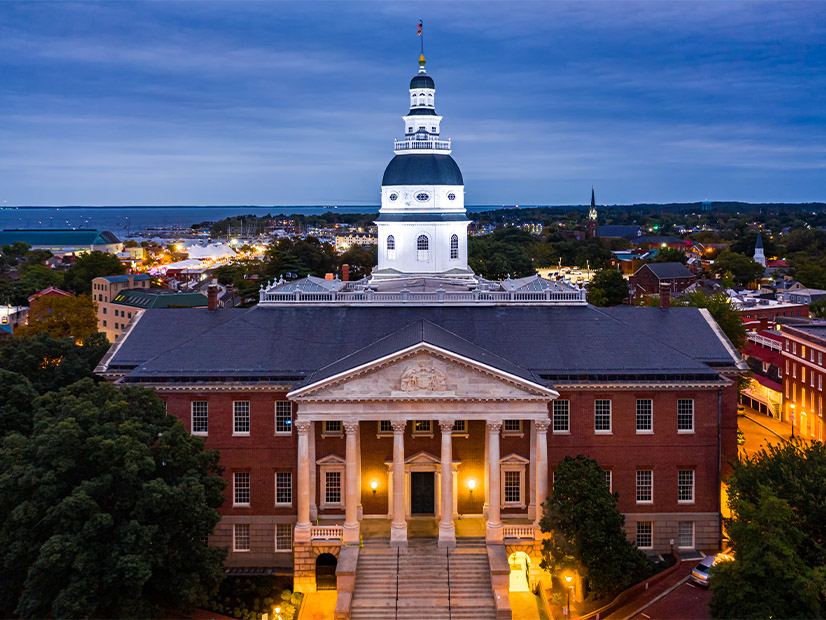Maryland’s House of Delegates on March 18 approved an ambitious plan for introducing time-of-use (TOU) rates for residential customers of the state’s investor-owned utilities, but only after provisions for a default, opt-out introduction of TOU was amended to a voluntary, opt-in program.
The Distributed Renewable Integration and Vehicle Electrification (DRIVE) Act (H.B. 1256) instead calls for the state’s Public Service Commission (PSC) to conduct a study of the impacts of the voluntary TOU program, determine whether a default rate would be justified and deliver a report to the General Assembly by Dec. 31, 2027.
As originally drafted by Del. David Fraser-Hidalgo (D), H.B. 1256 was intended to combine the default TOU rates with incentives for distributed renewable energy technologies to promote electrification of homes and transportation, while also promoting load management and flexibility to minimize impacts on the grid as electricity demand grows.
The bill was one of several pared-down energy bills that passed in the House or Senate on or before March 18, the General Assembly’s “crossover day,” when bills introduced in one house must be approved and sent on for a committee hearing and possible vote in the second house.
One example, Del. Lorig Charkoudian’s (D) H.B. 505, would have prohibited the state’s utilities from including the costs of any lobbying, political activities, membership fees or sponsorships in industry trade groups in their rates. Maryland is one of 11 states that have been considering such legislation to curb utilities’ political spending with their customers’ funds. (See Utilities Facing Increased Scrutiny Over Political Activities.)
Those provisions were crossed out in the amended version of the bill, which the House passed 99-38 and was sent to the Senate Committee on Education, Energy and the Environment. But in an interview with NetZero Insider, Charkoudian said the bill’s remaining provisions still would provide consumer savings and utility accountability.
Specifically, H.B. 505 would require Maryland utilities to become members of PJM, rather than join voluntarily. Under FERC rules, voluntary members get a 50-basis-point return on equity adder, which, Charkoudian said, translates to an extra $20 million in costs for the state’s consumers. Mandating membership in state law would save consumers “a significant amount of money,” she said. (See Citing California Law, FERC Rejects PG&E Request for RTO Adder.)
The other remaining section of the bill would require utilities to submit yearly reports to the PSC, detailing all their votes at RTO meetings, regardless of whether the proceedings and voting records already had been reported publicly.
Another Charkoudian bill, H.B. 1112, would allow the PSC to require the state’s utilities to acquire or contract for utility-scale energy storage projects if the commission finds storage to be a more cost-effective and efficient alternative to a reliability must-run (RMR) contract to keep a power plant running past its planned retirement date.
Charkoudian sees the bill as a new way to respond to situations like the potential closure of the Brandon Shores coal-fired power plant in 2025 and PJM’s efforts to keep the plant open with an RMR until 2028. PJM recently rejected the idea of storage as an alternative solution, as proposed in a recent report from GridLab and Telos Energy. (See PJM Rejects Storage as Alternative to Brandon Shores RMR.)
Passage of H.B. 1112 could provide a new option for Maryland, Charkoudian said. “We could spend all this money on reliability must-run, and [at] the other end, all we have is more greenhouse gas emissions and more pollution. Or we could take that very same money and spend it on battery storage, and we get the same reliability.”
But, she acknowledged, even if the PSC were to decide that storage would be a better option, PJM still would have to sign off on it. The bill passed 101-37 and was sent to the Senate Committee on Education, Energy and the Environment.
Other Bills Crossing Over
S.B. 1, sponsored by Sen. Malcolm Augustine (D), would require the state’s retail electricity providers that offer “green power” to their customers to document whether they actually are selling electricity generated by a renewable power project or the renewable energy certificates (RECs) from a project that could be located outside the state.
To offer green power, a retail supplier must show that the electricity being provided is at least 51% from renewables or RECs or at least 1% more than the amount of clean power required under the state’s renewable portfolio standard. For 2024, the state’s RPS calls for about 37% of Maryland’s power to come from renewables, but Gov. Wes Moore (D) has committed the state to 100% clean power by 2031.
Retailers also would have to have visible disclosure statements on their websites, explaining the purchase of a REC would not necessarily mean renewable energy also has been purchased.
The green power provisions are part of a larger bill focused on regulation of retail power suppliers. S.B. 1 passed in the Senate 33-14 on March 8 and was referred to the House Committee on Economic Matters.
Fraser-Hidalgo also is a lead sponsor on H.B. 689, which would replace Maryland’s $3,000 excise tax credit for electric or fuel cell vehicles with a rebate of the same amount, which auto dealers would provide at the point of sale. The original bill would have limited rebates based on consumers’ income, but those requirements were stripped out. The bill also includes $1,000 rebates for electric motorcycles and $2,000 rebates for three-wheeled motorcycles or “autocycles.”
The bill passed 103-36 on March 18 and has been referred to the Senate Committee on Budget and Taxation.


